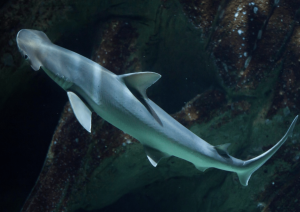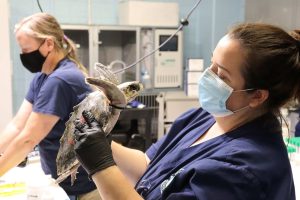Shark Week is officially underway with the Mississippi Aquarium celebrating the ocean predators in fitting fashion.
Throughout the week, the aquarium in Gulfport is sharing educational material on social media plus hosting an array of on-campus events to teach more people about sharks. With “FINFacts” posted throughout the aquarium, other daily offerings include photo ops in the shark room and a shark-themed scavenger hunt. On Saturday and Sunday, the Mississippi Aquarium will be joined by the University of Southern Mississippi Gulf Coast Research Lab for their annual Shark Weekend, which will feature shark-centric activities for visitors of all ages.
Dr. Alexa Delaune, vice president of veterinary services at the Mississippi Aquarium, believes this is a great time to both educate people about different species of sharks and to debunk the misconceptions that surround the oceanic creatures in need of protection.
“We’re going to have a lot of different ways people can learn about sharks. You can actually come here and see some of the species in real life swimming around,” Delaune said, noting that the Mississippi Aquarium has four species in-house.

“Sharks are very, very important to the ecosystem and if we take all the sharks away, then everything gets out of balance. So, it’s important for us to teach our guests about sharks, share some really cool fun facts about them, and just get people to appreciate them and recognize that they’re very important and we need to do everything we can to keep them in our world.”
Delaune explained that without sharks and their roles as apex predators, marine ecosystems would virtually crumble as sharks serve as an indicator of ocean health. Sharks maintain species below them in the food chain by removing the weak and the sick, which helps ensure species diversity when it comes to fish and other invertebrates.
She did acknowledge that most news coverage regarding sharks is when an attack happens. However, Delaune said unprovoked shark attacks happen rarer than people think and when a shark does attack a human, it’s usually due to it mistaking a person for a fish or sea lion, or simply out of fear.
“When sharks are in the news, it’s usually for something like a shark bite,” Delaune said. “It’s very sad and can result in very bad injuries or even death. But I don’t believe the sharks are intentionally attacking people. If you think about how many people swim in the ocean all the time, it’s a very small number of people who get hurt.”

Delaune, who is one of a small number of shark veterinarians in the Gulf Coast region, said knowledge is power when it comes to getting in the ocean, reminding people that humans are technically encroaching upon not only sharks but millions of other species’ home when they decide to swim in the ocean. While she does not discourage ocean activities such as swimming and fishing, she believes Shark Week is a great time to get educated on what’s out there and how to take precautions when necessary.
“We just need to do everything we can,” Delaune said. “If you see sharks in the water, obviously don’t go into the water. If you’re fishing and have a lot of bloody bait, then watch out for sharks. Just know that they’re doing what sharks should do. You just have to use common sense while being very careful and heeding the warnings. Don’t go in at dusk. Do all those things you’re told to do.
“I think sometimes when you learn more about something that’s scary then you feel less scared if you kind of know what to expect or know how they might act or the kind of areas they like to be in.”
Of course, Shark Week at the Mississippi Aquarium pairs with Discovery’s annual TV block, Shark Week. While Delaune is a fan of the awareness the popular program has brought to sharks, she encourages people to watch the documentary-style segments rather than the sensationalized ones such as “Jaws vs. Leviathan.”
Mississippi State researchers aid in documented sighting of Great White off Alabama coast




